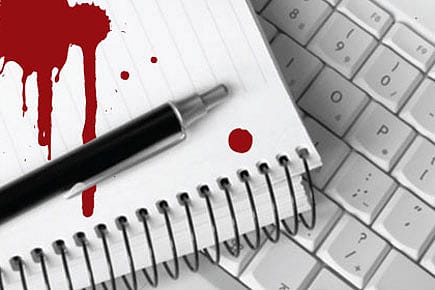Hunter-(News) Gatherer

Or the perils of living off the news
There is a phrase Jews use when saying goodbye: 'Only good news', or a slight variation, 'We should only hear good news.' This is said in a deceptively casual manner, sounding almost like an afterthought. But it holds within it the most fundamental of our human longing: Please Creator, or whoever it is taking care of it all, please, we beseech You, don't let anything bad happen, we dread the pain of experiencing it, we dread the pain of hearing about it.
I was thinking about this while sitting on my beat-up Kinetic outside my crumbling home. It was a monsoon night, some seven years ago, in the early days of my stint as a 'Foreign Correspondent'. It was a job I had not particularly wanted, having dropped out of the news world years ago. But circumstances had conspired successfully, and here I was, on my way to town, hoping to find an internet café' that was still open (Tata Photon and its cousins had not yet arrived). I had just had a call from the editor on duty in the newsroom; she said they had heard from some source that a bomb or a few bombs had exploded somewhere in the west of India, possibly Mumbai. They had no details. "Get us the information, and be quick," was her urgent request from the high-tech newsroom in Tel Aviv.
I called whatever contacts I had back then (a taxi driver, a rabbi, a sadhu). They hadn't heard anything. I needed the power of a search engine at my fingertips. Key in the ignition, choke pulled out to max, I took a moment to collect my thoughts, to slip into gear. I had been in the middle of singing lullabies when the call came.
Back then (okay, now as well), I was employed in the same way most journalists in my country are—a certain monthly sum to make me "theirs"; and a per-story fee, dependent on some complex logarithm involving the number of words, the perceived importance of the story, the page or supplement in which it would appear, and perhaps the affection and mood of the editor on payroll day. Those had been especially lean times for my little family: all quiet on the India front for many months, without enough happening to put any trimmings on our table. As I sat on my scooter, the precious minutes ticking away, I wondered what I wished for at the moment. I ran through the possible ways this situation could pan out. I could find out that:
AIming High
20 Feb 2026 - Vol 04 | Issue 59
India joins the Artificial Intelligence revolution with gusto
» There was indeed a bomb, but a small one. Upto 3 dead, upto, say, 15 injured. This would warrant one story at least, probably on an inside page. (Some trimmings for my table.)
» There was indeed a bomb, a big one. Many dead, many injured. This would make it to the front page, perhaps above the fold if enough had died. This would also almost certainly warrant follow-up stories over the next several days. (Many trimmings for my table; replace the broken table?)
» There was indeed a bomb, and Israelis had been injured or even killed. This would almost certainly warrant the main headline of the newspaper. I would definitely have to travel to the scene, covering all of the resulting sub-stories, for many days. (The month's rent, school tuition, new table, replace beat-up scooter?)
» There was no bomb; it was just a rumour. I would drive home and crawl back into bed. (Zilch.)
It was a magical night: moonlit raindrops glistened on giant, heart-shaped leaves, crickets sang of love and lust, everything smelled like water. I felt I was being asked to honestly choose the reality I most hoped for; and it seemed like the right time to pray. The Hebrew words rak b'sorot tovot (only good news) came to mind. As I prayed for only good news, I realised I would never be a great foreign correspondent (and that the pay-per-story model for news journalists was unethical at the deepest level). When I reached the internet café', soaked in rain, I found my prayers had been answered. I think the editor on duty in the newsroom was relieved as well, but she was too busy to chat—some other news was breaking somewhere else on the globe. I remember the soft golden light through my window as I parked my bike, scurried up the path, and went back to bed.
